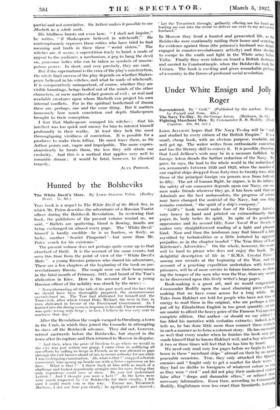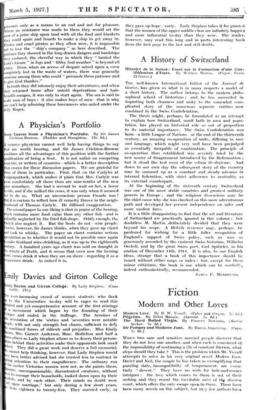Under White Ensign and Jolly Roger
LORD JELLICOE hopes that The Navy To-day will be " real and studied by every citizen of the British Empire." It i, small, cheap book, with an obvious purpose, readable, and well got up. The writer writes from enthusiastic conviction and has the literary skill to convey it. It is possible, therefore. that Lord Jellicoe's wish may be in a measure fulfilled. Sir George Aston dreads the further reduction of the Navy. We gave, he says, the lead to the whole world in the reduction of sea armaments between 1920 and 1923, when the number of our capital ships dropped from forty-two to twenty-two, while those of the principal foreign sea powers rose from forty-six to fifty. The art of human flight, lie argues, is in its infancy, the safety of our commerce depends _upon our Navy, our sea- men make friends wherever they go, it has been said that our Admirals are the best ambassadors, the progress of science may have changed the materiel of the Navy, but one thing remains constant, " the spirit of a ship's company." Griffis" book would make four of Sir George Aston's; very heavy in hand and printed on extraordinarily thick paper, its body belies its spirit. In spite of its ponderous appearance and its second title, Some. Naval War Secrets. it makes very straightforward reading of a light and pleasant kind. Now and then the landsman may find himself a little mystified by technicalities or a little irritated by apparent prejudice, as in the chapter headed " The True Story of Lord Kitchener's Adversities." On the whole, however, the reader will be hard to please who does not enjoy the book. The delightful' description of life in " H.M.S. Crystal Palace' among raw recruits at the beginning of the War. and the account of a poaching expedition undertaken with German prisoners, will be of more service to future historians, as show' ing the temper of the men who won the War, than any secrets to be discovered upon this lively writer's large pages.
Book-making is a great art, and we would congratulate Commander Bodilly upon the most charming piece of book- making that we have come across for a long while. lib Tales from Hakluyt are told for people who have not time or energy to read them in the original, who arc perhaps a little put off by Elizabethan English in too great quantity, or `th" are unable to afford the heavy price of the Famous Voyages all complete edition. Our author—or should we say editor"-- has tilled his narrative with verbatim extracts ; indeed. Or tells us, he has done little more than connect these extraeb in such a manner as to form a coherent story. He has succeeded so well that every reader when he finishes the book may Per" suade himself that he knows Hakluyt well, and a boy who read it two or three times will feel that he has him by heart. We need only read very few pages before we begin to feels' Bodilly, Englishmen were less cruel.than Spaniards, on;.inicitita asr,, tortannl home in these "merchant ships" abroad on their by peaceable occasions. True, they only attacked the Queen enemies and "fought only to get a market for their waro • they had no dislike to foreigners of whatever colour ea aig as they were `.` civil " and did not play their undesired ° false after " deepe and damnable othes," or refused then' necessary information. Even then, according to Con lode risoners only as. a means to an end and not for pleasure. 'here no resistance was made to them they would set the few of a prize ship upon land with all the food and blankets 'ley could spare and boards to make a ship to get away in. irates and cruel pirates as they often were, it is impossible t to love the "ship's company" as here described. The hence they showed in the long-drawn dangers and hardships hey endured, the cheerful way in which they " tarried the aard's leisure " in fogs and " filthy foul weather " is beyond all raise. Even when an access of despair seized upon a crew ompletely lost in the waste of waters, there was generally none among them who could persuade them patience and o give God thankes."
In truth they did intensely enjoy their adventures, and when hey returned home after untold deprivations and hair- eadth escapes, it was only to start again. The sea is said to ake men of boys : it also makes boys of men—that is why ne can't help admiring these buccaneers who sailed under the oily Roger.































































 Previous page
Previous page